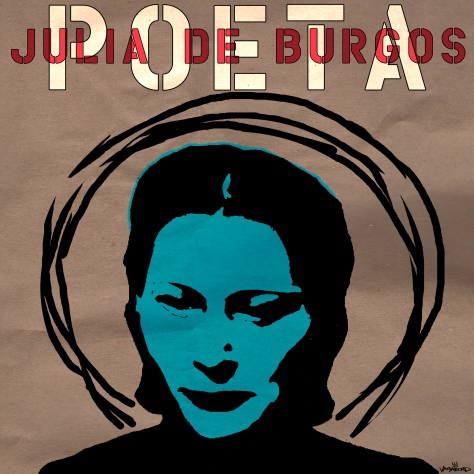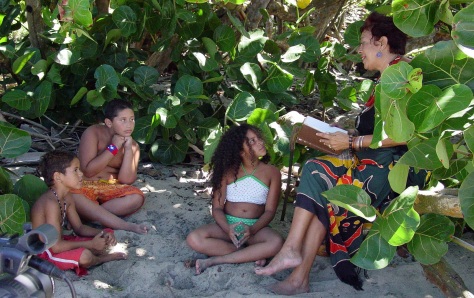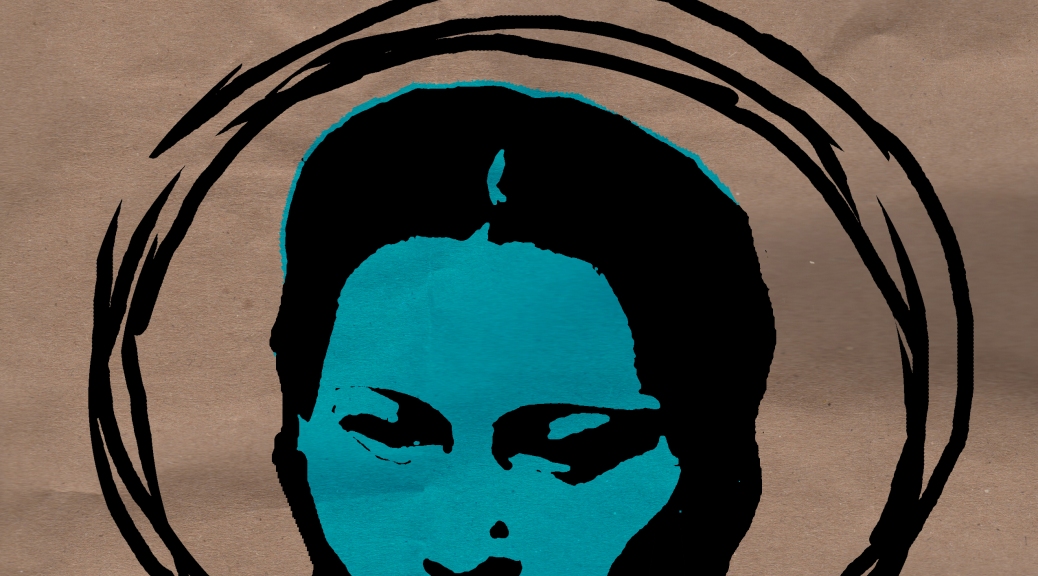
“I have an urge for freedom. If I die I do not want this tragic nation to swallow my bones. They need the warmth of Borinquen, to at least fortify the worms from over there, not the ones from here.” – Julia De Burgos
(written from New York in a letter to her sister).
Julia De Burgos is considered one of the greatest poets of Latin America, she was also an advocate for the independence of Puerto Rico, an ardent civil rights activist for women, African and Afro-Carribbean people and a vocal critic of any and all political tyranny. She was born in Carolina, Puerto Rico on February 17, 1914. Today she would have been 100 years old.
Burgos was raised in a poor section of Carolina called Barrio Santa Cruz. Her family’s poverty did not keep her from developing a love for nature and her nation. At the age of 19, she graduated from the University of Puerto Rico and became a teacher. Her love of literature led her to write poetry and her primary inspiration was her homeland.
In 1936, she joined the Daughters of Freedom, the women’s branch of the Puerto Rican Nationalist Party (Partido Nacionalista de Puerto Rico), which at the time was headed by the Puerto Rican liberationist Pedro Albizu Campos. She published three books of poetry (the third was published after her death) and traveled around the island-nation promoting (and supporting) herself and her art by giving book readings.
In 1939, Burgos traveled first to Cuba and then later to New York City where she lived on and off for the next several years. On July 6, 1953, she collapsed on a sidewalk in El Barrio/East Harlem, NY and later died of pneumonia at a hospital in Harlem at the age of 39. Since her body was not initially identified/claimed by anyone, the city of New York gave her a pauper’s burial on Hart Island, the city’s only Potters field.
Later, some friends were able to find her grave and claim her body. A committee was organized in Puerto Rico, to have her remains transferred to the island-nation. Julia’s remains arrived on September 6, 1953, and she was given a hero’s burial at the Municipal Cemetery of Carolina. A monument was later built at her burial site by the City of Carolina, Puerto Rico. She was and still is Puerto Rico’s poet laureate.

There’s a very important scene in my film MACHETERO where Dylcia Pagan who plays the part of the Mentor in the film (Dylcia is a former Puerto Rican Political Prisoner and Prisoner of War and a current Puerto Rican National Heroine) reads a poem by Julia De Burgos. In the scene a group of children come running up to Dylcia with a book of Julia’s poems asking her to read something to them… The poem she chooses is Amaneceres (Dawnings). It’s a pivotal scene in the film because the lead character Pedro Taino (played by Not4Prophet of the Puerto Rican Punk band RICANSTRUCTION and Hip-Hop group X-Vandals) writes a manual on how to be a Machetero called The Anti-manifesto. The Anti-manifesto is a series of poetic writings that are featured throughout the film. The poetry reading scene takes place in the final third of the film and helps to illuminate how this character Pedro Taino who doesn’t even have a High School Diploma can write so well.
This poetry reading scene is presented within the overall film to be a kind of dreamlike flashback to Pedro’s childhood. The idea is that one of the children in the group that Dylcia (the Mentor) is reading to, is Pedro. The poem itself is about transformation. The transformation of self and society which is what the film is also about. Pedro Taino transforms himself from victim of colonialism to combatant to colonialism. The Young Rebel (played by Kelvin Fernandez) transforms himself from victim of colonialism to combatant against colonialism. Both of these characters are transforming themselves and in doing so are transforming society as well.
Before we left for Puerto Rico Not4Prophet came up with the idea for this poetry reading scene. He felt that it would give an understanding as to how the Pedro Taino character was encouraged to educate himself. It also gave Pedro’s character an appreciation of poetry and writing that would not otherwise be expected in him and this gave his character an added layer to his dimensionality. While we were in Puerto Rico we didn’t know exactly how we were going to portray this scene, (we improvised a lot on this film). We knew how the other crucial scene with Dylcia would play out but we didn’t know how the poetry scene would develop.
Yasmin Hernandez (Yaz) a talented Puerto Rican painter came with us to Puerto Rico to help with the shoot. Yaz is a good friend of mine and had been following MACHETERO’s development as we were in the process of creating the film. She was reading a compilation of Julia De Burgos poems called Songs Of The Simple Truth and she came across the poem Amanecers (Dawnings). It was a truly perfect fit.
When we shot the scene the next day i used my nephew and niece who also came down with us to Puerto Rico but more to enjoy the beauty of the island than to work on the film. However when i asked them if they wanted to do it they were excited and we improvised the scene as we shot it…
Another part of this scene that’s important to highlight comes from the old African adage that it takes a village to raise a child. Dylcia’s role to these children is deliberately kept ambiguous. She is mother, aunt, grandmother, neighbor, teacher to these children. Even her role in the credit is referred to as The Mentor, because a mentor can be a mother, aunt, grandmother, neighbor or teacher. In the African tradition these roles may be interchangeable to a child living within the community but the one constant that remains is the mentorship. In the other scene that Dylcia is in she’s imparting the history of colonialism in Puerto Rico (unfortunately this history is not exclusive to Puerto Rico but extends to Haiti, Jamaica, Cuba, Dominican Republic, etc…) and she does this using the oral tradition which is also an African trait. The reading of Julia De Burgos and the reading of this poem to the children combined with Dylcia’s other scene in the film come together to create a portrait of a woman who is creating warriors for freedom. It’s a scene that puts the struggle for our freedom (Puerto Rico and beyond…) into a multi-generational light.
The fact that Dylcia is the one who is imparting this history and this culture to these children in this scene in this film only added a special kind of gravitas to the film. Dylcia Pagan is a warrior and a freedom fighter who served 20 years in US prisons for fighting to free Puerto RIco from the yoke of US colonialism. She is a Puerto Rican National Heroine and of course she has always related to Julia De Burgos.
DAWNINGS
by Julia De BurgosDawning in my soul!
Dawnings in my mind!When the intimate door is opened
to enter one’s self
what dawnings!To gather the hour that passes trembling at our side
and make it now,
and make it robust,
and make it universal.And let it sing
and let it scream;
and let it penetrate in all anonymous corners
awakening rebellions;
and let it sweep the face of the eternal hunchback of time
sick of not thinking;
and let it hang all the songs of the bourgeois ways
and break its seconds into a million proletarian hymnsDawning in my soul!
Dawnings in my mind!
When the intimate door is opened
to enter one’s self
what dawnings!There inside,
deep inside,
to approach life
To see…
To listen…
To smell…
To taste…
And touch…
earthAnd in the earth…
man
perpendicular over his own life.
Man earth
made in two violent dimensions.
The common dimension:
five senses,
and one body and one mind.
The whole man. Him.The other,
the social dimension;
tradition,
race,
capital.
Man bourgeoisfied
of body,
of mind,
of energy.
Man derailed
fleeing ferociously from himself.That bourgeois man
must be destroyed,
now,
at the present time,
in the robust hour,
in the universal hour.
The world awakens!When the intimate door is opened
to enter one’s self
what dawnings!from Songs Of The Simple Truth (translation by Jack Agueros)
Shortlink: http://wp.me/p1eniL-1iE

Reblogged this on .
Reblogged this on Una Luna Melintasi Nusantara and commented:
Orgullosa de la poesia de mi isla!